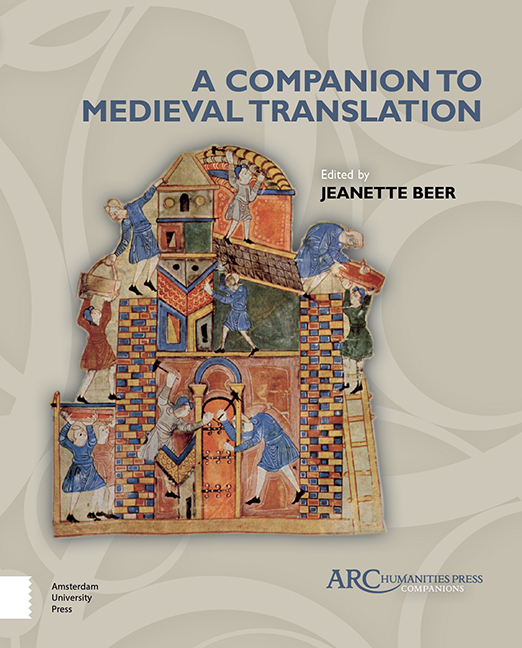Book contents
- Frontmatter
- Contents
- Acknowledgements
- Introduction
- Chapter 1 The European Psalms in Translation
- Chapter 2 The Old French Bible
- Chapter 3 Middle English Religious Translation
- Chapter 4 Bible Translation and Controversy in Late Medieval England
- Chapter 5 Medieval Convent Drama: Translating Scripture and Transforming the Liturgy
- Chapter 6 Translating Romance in Medieval Norway: Marie de France and Strengleikar
- Chapter 7 Christine de Pizan, Translator and Translation Critic
- Chapter 8 Translation, Authority, and the Valorization of the Vernacular
- Chapter 9 Vernacular Translation in Medieval Italy: volgarizzamento
- Chapter 10 Dante and Translation
- Chapter 11 Chaucer and Translation
- Chapter 12 Alchemy and Translation
- Chapter 13 Scientific Translation: A Modern Editor’s Perspectiv
- Chapter 14 Modern Theoretical Approaches to Medieval Translation
- Chapter 15 Observations on Translation by a Thirteenth-Century Maître: Li Fet des Romains
- Epilogue. Observations on Translation by the Oxford Professor of Poetry: Pearl
- General Bibliography
- Appendix
- Index
Epilogue. Observations on Translation by the Oxford Professor of Poetry: Pearl
Published online by Cambridge University Press: 20 November 2020
- Frontmatter
- Contents
- Acknowledgements
- Introduction
- Chapter 1 The European Psalms in Translation
- Chapter 2 The Old French Bible
- Chapter 3 Middle English Religious Translation
- Chapter 4 Bible Translation and Controversy in Late Medieval England
- Chapter 5 Medieval Convent Drama: Translating Scripture and Transforming the Liturgy
- Chapter 6 Translating Romance in Medieval Norway: Marie de France and Strengleikar
- Chapter 7 Christine de Pizan, Translator and Translation Critic
- Chapter 8 Translation, Authority, and the Valorization of the Vernacular
- Chapter 9 Vernacular Translation in Medieval Italy: volgarizzamento
- Chapter 10 Dante and Translation
- Chapter 11 Chaucer and Translation
- Chapter 12 Alchemy and Translation
- Chapter 13 Scientific Translation: A Modern Editor’s Perspectiv
- Chapter 14 Modern Theoretical Approaches to Medieval Translation
- Chapter 15 Observations on Translation by a Thirteenth-Century Maître: Li Fet des Romains
- Epilogue. Observations on Translation by the Oxford Professor of Poetry: Pearl
- General Bibliography
- Appendix
- Index
Summary
(Simon Armitage’s preface to Pearl is reprinted by permission of Faber and Faber Ltd. and of W. W. Norton and Company. It brings our Companion to Medieval Translation into the present century, demonstrating that although differences in time and distance bring changing contexts, translation remains as vital in the twenty-first century as it was in the Middle Ages. Pearl received the PEN Poetry Translation Prize in 2017.)
Heartbroken and in mourning, a man describes the terrible sorrow he feels at the loss of his beautiful and irreplaceable “Perle.” In August, with flowers and herbs decorating the earth and perfuming the air, he visits a green garden, the scene of his bereavement. Tormented by images of death and decay, devastated by grief and overpowered by the intoxicating scent of the plants, he falls into a sudden sleep and begins to dream, embarking on an out of body experience that will lead to an encounter with his departed pearl who we learn is his child, and a journey to the gates of heaven.
Probably composed in the 1390s, only one copy of the untitled poem that has come to be called Pearl remains in existence. It was originally housed in the library of Henry Savile of Bank, in Yorkshire, then later in a collection belonging to Sir Robert Cotton, and is now held in the British Library as MS Cotton Nero A.x. (each bookcase in Cotton’s library was overlooked by a bust of a famous historical figure, including several Roman emperors). Pearl is the first poem in a manuscript that also includes Sir Gawain and the Green Knight, Patience, and Cleanness (or Purity). All four poems are in the same hand, and although the writing probably belongs to that of a scribe rather than the original author, most scholars believe they were composed by the same person, about whom we know very little. The historical context leads us to assume he was a man, and from the content of the poems we can deduce that he was well educated, well read, and very well acquainted with the Bible, though not necessarily a man of the cloth.
- Type
- Chapter
- Information
- Companion to Medieval Translation , pp. 185 - 188Publisher: Amsterdam University PressPrint publication year: 2019

